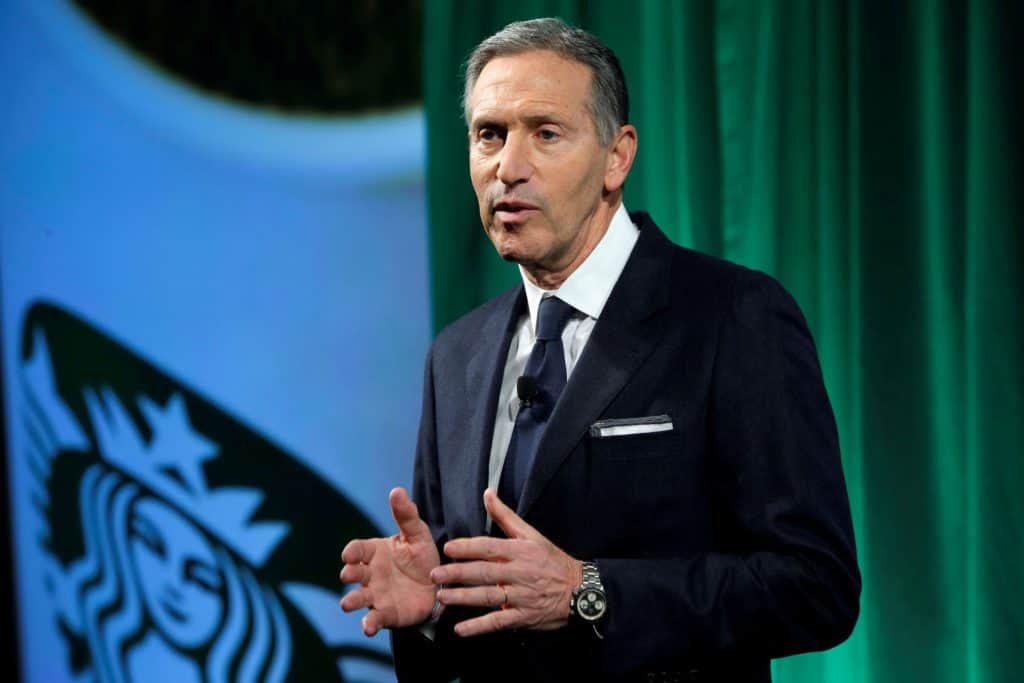‘Thank You Howard”

By Dan Murphy
We often hear the question, Why don’t more people run for office? The answer for most is that they refuse to put their private and personal lives through the meat grinder that is now our political discourse and the “gotcha” media and “if it bleeds, it leads” mentality. But when someone steps forward to challenge the status quo and run for office, many of the same people who wonder why more people don’t run like to tear down those who have decided to run.
Former Starbuck’s CEO Howard Schultz announced via twitter: “I love our country. I am seriously thinking of running for president as a centrist independent.” That exploration, coming from a 65-year-old billionaire with a successful track record of building a business that is now part of Americana, and who rose from poverty in the housing projects of Brooklyn to live the American dream, and who now wants to give back and serve our country, was met with negative headlines, and outrage from many democratic and progressive Americans.
Democrats are once again concerned that Schultz’ presence in the race would help re-elect President Donald Trump. This same argument has been repeated again and again in recent history, that the independent, third-party presidential candidate helped elect ‘the other guy.” But it’s not true.
In 1992, Ross Perot was blamed for George H.W. Bush’s loss and Bill Clinton’s victory. In 2000, it was Ralph Nader who was blamed for Al Gore’s loss to George W. Bush. And in 2016, Jill Stein and Gary Johnson were blamed for Hillary Clinton’s loss and Trump’s victory. But the data from each of these elections tells us a different story.
Perot took votes evenly away from Bush 41 and Bill Clinton, according to polling data and by respected polling expert Nate Silver, who calls this “The Perot Myth.” In 2000, Green Party candidate Nader was blamed for Gore’s narrow loss to Bush 43, despite the facts that showed that 250,000 Florida democrats voted for Bush, and that Gore lost his home state of Tennessee, and that Gore ignored Bill Clinton, who he could have used to rally the democratic base.
In 2016, Green Party candidate Stein and Libertarian candidate Johnson, were both blamed for Hillary Clinton’s loss and Trump’s victory. The real reason Clinton lost was that Trump motivated his voters, and his base, to come out to vote, and that Independent voters went Trump’s way, and that Clinton never campaigned in the swing states of Wisconsin and Michigan in the final days of the campaign.
And what about the 100 million eligible American voters who didn’t cast a vote in 2016? Should we blame the third-party candidates for their apathy? Or if we offered those same 100 million voters another viable choice for president, might they come out and vote? If you are a progressive democrat still upset about a President Trump, “I suggest you focus your energy on those who didn’t get off their ass,” said CNN commentator Michael Smerconish, who started his Saturday show with the words “Thank you, Howard,” for tossing his hat into the ring, at least for consideration.
Schultz has hired one democrat and one republican consultant. Democrat Bill Burton, who worked on President Barack Obama’s campaigns, said: “What Howard Schultz is saying as he considers this bid for the presidency is that the two parties have moved so far apart, but the American people in the middle are losing their voice. He is trying to see if there is an interest in trying to find a better way.”
Actor Jon Favreau and others have criticized Schultz, a former democrat, by saying that if he really thinks he can win the presidential election, then he should run as a democrat. Schultz disagrees with some of the recent progressive views in the democratic party, like completely ending the health insurance industry and eliminating Immigration and Customs Enforcement and has been watching the increasing dysfunction in Washington, D.C., with government shutdowns and increased hostility and sniping on both sides of the aisle, and wants to see if the American people are interested in trying something different.
“He (Schultz) thinks that Donald Trump is fundamentally unfit for office and is willing to do all that he can to stop that (his re-election) from happening,” said Burton. “He is asking the American people, Do you want a new choice… A lot of people are interested and want to be involved in some way, democrats, republicans and independents, a true diversity of thought and interest.”
One question that many political watchers are asking is, What does Schultz see in a third-party presidential bid that another billionaire doesn’t see? Former New York City Mayor Michael Bloomberg took a serious look at running for president as an independent in 2016, but decided against it because he believed he could not win a majority of electoral votes to win the presidency.
Bloomberg has since donated millions to democratic candidates in 2018, which helped democrats retake the House of Representatives, and is now seriously considering a run for president as a Democrat. Bloomberg has visited Iowa and New Hampshire already, but has yet to make a formal announcement.
“Last fall I spent over $100 million of my own money to elect Democrats to the House because I believed it was absolutely imperative to ensure a congressional counterweight to President Trump,” said Bloomberg. “Thankfully, we were successful. But that was just the first step – the next and most important step is to defeat Donald Trump in 2020.
“Now I have never been a partisan guy – and it’s no secret that I looked at an independent bid in the past. In fact I faced exactly the same decision now facing others who are considering it. The data was very clear and very consistent. Given the strong pull of partisanship and the realities of the electoral college system, there is no way an independent can win. That is truer today than ever before.
“In 2020, the great likelihood is that an independent would just split the anti-Trump vote and end up re-electing the president,” continued Bloomberg. “That’s a risk I refused to run in 2016 and we can’t afford to run it now. We must remain united, and we must not allow any candidate to divide or fracture us. The stakes couldn’t be higher.
According to the latest Gallup poll, 39 percent of Americans describe themselves as Independent, more than the 34 percent who say they are democrats, and 25 percent who ID as republicans. Some of those independents have wondered out loud why there is such a large outcry against someone like Schultz wanting to run for president? What are they afraid of?
Billionaire Mark Cuban, who also considered a presidential, run tweeted, “If 21 months before an election you don’t believe your candidate’s platform is strong enough to win an election with independent candidates, you might want to rethink who you support.” And if you are wondering why so many billionaires may be interested in the presidency, and in running as an independent… you need about a billion to run for president, to offset the democratic and republican national committees, and their fundraising machines.
Former Trump advisor Anthony Scaramucci said he believes that Bloomberg and Schultz would make “phenomenal presidents” and could defeat Trump if they ran in 2020. On his radio.com podcast, “Mooch and the Mrs.,” Scaramucci said on Bloomberg: “He’s ready for it. He’s been through it before, on a local level. I think Mayor Bloomberg was arguably… the best mayor of my lifetime.”
And on Schultz: “Howard Schultz is qualified to be president. Is he a great leader? No question. Did he build a phenomenal company? Unbelievably so. He has a great life story, coming from the city projects… to where he is today.”
We respectfully disagree with Bloomberg. It is time for an independent presidential candidate to break through. Some would argue that Trump ran as an independent candidate in 2016, with the republican nomination. We do agree with Scaramucci that the only two candidates we would vote for today is Bloomberg and Schultz. So thank you, Howard, for attempting to have the conversation.





